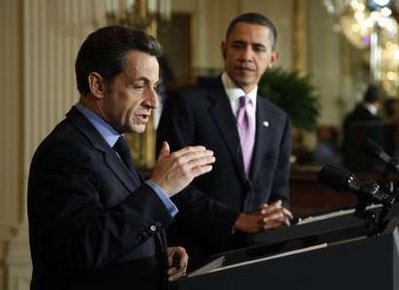
French President Nicolas Sarkozy (L) speaks during a joint news conference with US President Barack Obama in the East Room of the White House in Washington, March 30, 2010.[Photo/Agencies]
|
 French President Nicolas Sarkozy (L) speaks during a joint news conference with US President Barack Obama in the East Room of the White House in Washington, March 30, 2010.[Photo/Agencies] |
WASHINGTON – With the president of France at his side, US President Barack Obama declared Tuesday he hopes to have international sanctions against Iran in place "within weeks," not months, because of its continuing nuclear program. But he acknowledged he still lacks full support at the United Nations.
"Do we have unanimity in the international community? Not yet," Obama said. "And that's something that we have to work on."
Obama said he and French President Nicolas Sarkozy are "inseparable" in their thinking on the subject.
For his part, Sarkozy told reporters, "Iran cannot continue its mad race" toward acquiring nuclear weapons.
"The time has come to take decisions," he said.
On the UN Security Council, veto-wielding permanent members Russia and China have expressed reservations toward a tougher set of sanctions, as have several of the rotating members who do not have veto powers.
"My hope is that we are going to get this done this spring. So I'm not interested in waiting months for a sanctions regime to be in place. I'm interested in seeing that regime in place in weeks."
Earlier Tuesday, Secretary of State Hillary Rodham Clinton predicted new sanctions would be forthcoming, hinting that skeptical nations such as China and Russia would eventually come along. At the conclusion of an international meeting of eight major powers in Quebec, Clinton cited a growing alarm around the world about the consequences of a nuclear-armed Iran.
A senior French official said after the White House meeting that key Western players including France are ready to consider unilateral sanctions if they can't get a strong enough UN resolution passed. The official spoke on condition of anonymity in keeping with the French custom.
Obama and Sarkozy met privately in the Oval Office and later planned dinner at the White House with their wives, Michelle Obama and French first lady Carla Bruni-Sarkozy.
Obama said he and the French president discussed a wide range of global issues, including the financial regulatory overhaul and peace negotiations in the Middle East.
Sarkozy also said he stands with the United States in condemning recent Israeli settlement activity in east Jerusalem.
Sarkozy praised Obama for trying to engage the two sides in peace talks. Sarkozy said that the "absence of peace" in the region "is a problem for all of us" - and that it feeds terrorism around the world.
On a subject on which the two presidents don't see eye-to-eye, Sarkozy expressed a widespread European contention that the award of a $35 billion US Air Force refueling tanker plane was rigged to favor US aerospace giant Boeing over an alliance of the parent of Europe's Airbus and the US Lockheed-Martin company.
Sarkozy said he believed it would be "fair to share this contract with the Europeans" instead of awarding it solely to Boeing.
Obama said that while "the process will be free and fair," the final decision would be made by Defense Secretary Robert Gates.
Obama hailed France as one of the United States' oldest and best allies, noting the two countries have fought together on battlefields from Yorktown in the Revolutionary War to Afghanistan now.
However, the two have had clear differences on Afghanistan, with the Obama administration pressing France as well as other European nations to send more troops, and Sarkozy largely resisting such requests.
Obama did not go into Tuesday's meeting intending to urge Sarkozy to send more troops, White House press secretary Robert Gibbs said ahead of the meeting. "There's no specific 'ask' on the table," Gibbs said at his daily news briefing.
Instead of troops, France is ready to consider sending more military or police trainers to Afghanistan, according to the senior French official. He would not elaborate on how many could go or when, saying only "There is no deadline. There is the certitude that there is a need for trainers."
The two presidents discussed the possibility of training Afghan forces outside Afghanistan because infrastructure there is so poor, the official said.
French trainers have been among those killed in Afghanistan this year, and polls show most French voters don't support the effort.
Both presidents went to extraordinary lengths to defuse trans-Atlantic speculation of a chilly relationship. Obama repeatedly referred to Sarkozy by his first name and spoke fondly of his trip to Paris last year. "We respect one another and understand one another," Obama said.
The private dinner invitation was also a gesture rarely extended to foreign leaders.
Just a day earlier in New York, Sarkozy spoke bluntly about the US role in foreign affairs, saying the world needed an America that listens. Yet when asked directly whether he thinks Obama listens to him, Sarkozy offered a long defense of his relationship with Obama. He called it candid and productive.
"President Obama, when he says something, keeps his word," Sarkozy said. "His word is his bond. And that is so important."